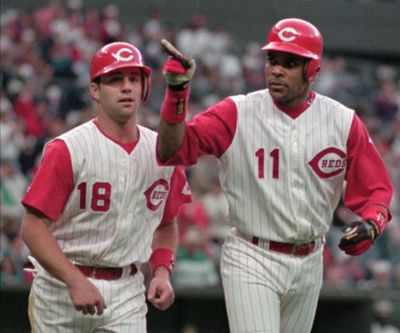Larkin spoke out
Former Reds player part of broadcast

CINCINNATI – Shortstop Barry Larkin got death threats when he spoke out against racial bias during Marge Schott’s ownership of the Cincinnati Reds, showing him firsthand about prejudice.
Larkin will be back in town this weekend to broadcast a Reds game for the first time as part of Major League Baseball’s Civil Rights weekend, honoring those who have fought for equality. Larkin will do commentary for the MLB Network’s broadcast of a game against the St. Louis Cardinals tonight.
It’s an appropriate setting for calling his first Reds game.
Larkin was the Reds’ team captain in the 1990s, when Schott made racially and ethnically inflammatory comments and was repeatedly suspended by baseball. Larkin didn’t hide from the issue, and learned there was a cost to speaking out against prejudice.
It came in the mail.
“I was told I needed to be quiet and just be thankful I had a job and basically, I wasn’t supposed to have an opinion,” Larkin said in a telephone interview with the Associated Press. “I don’t know who it was that sent the hate mail. I gave all of that to the FBI, because they wanted to make sure we were protected as players and as citizens.”
Before the game today, Larkin will be part of a panel discussion on baseball and the civil rights movement. Baseball will present its annual Beacon Awards to Hall of Famer Willie Mays, tennis player Billie Jean King and entertainer Harry Belafonte, a civil rights activist.
Larkin, now 46, said he was aware of the racial divide when he was growing up, but didn’t encounter much prejudice in Cincinnati.
“I remember playing on pretty much an all-minority youth team and going to some of the tournaments north of Cincinnati and not being able to stay with host families where all the other teams were staying with host families,” he said. “Our coaches were fighting the battles for us and bringing up the issue of race.”
Larkin went to Michigan and returned to his hometown team as a first-round pick. He helped the Reds win a World Series in 1990, and was the National League MVP in 1995, when the Reds last appeared in the playoffs. During that time, Schott began to overshadow her team, getting suspended twice for inflammatory remarks. She faced another suspension when she sold the team in 1999. Schott died five years later.
“Marge treated our family with nothing but respect,” Larkin said. “She was very gracious, very accepting and very respectful. In my personal experience, she was absolutely wonderful to me and my family.
“When this issue did come up, I was asked about it. The stance I took was there is no room for racial bias anywhere in sports. I believe that was basically all I said about it. Certainly I was cast as an abolitionist. Death threats came. Hate mail came. It was uncomfortable for me, but I felt good about the fact that I didn’t hide from the issue.”
Larkin played for his hometown team through 2004, when the former owners didn’t want to offer another contract. Larkin had a chance to extend his career in Washington under former Reds general manager Jim Bowden, but couldn’t envision himself in anything other than a Reds uniform. So he retired.
Larkin was an adviser to Bowden for a few years and had several business interests. The rift with the Reds remained until Bob Castellini took over as owner. Larkin was invited to spring training in Arizona this year, his first chance to work with his former team on the field.
The Reds suggested he call the Civil Rights game on their network, and Major League Baseball decided to make him part of its broadcast. Larkin has been an MLB analyst, but hasn’t done a Reds game.